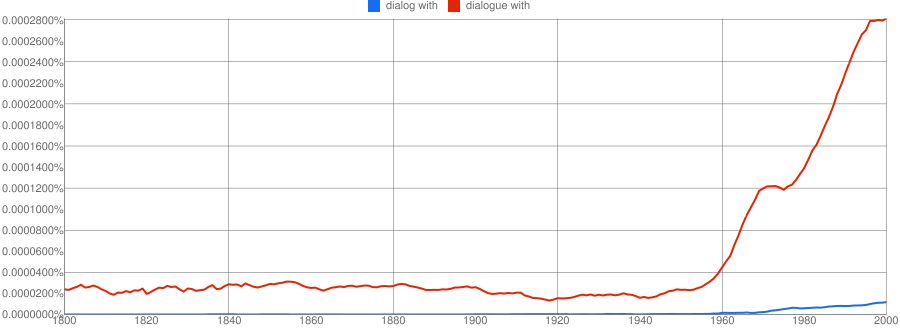The first (1898) and second (1910) editions of Merriam-Webster's Webster's Collegiate Dictionary series list only dialogue as an acceptable spelling for that word. But the Third Collegiate (1916) has this:
dialogue, n. Also, Ref. Sp., dialog. ... 1. A written composition representing two or more persons as conversing or reasoning; as, Plato's Dialogues. 2. A conversation between two or more.
The odd-looking label "Ref. Sp." before the spelling dialog is short for Reformed Spelling. Spellings identified under this label reflected the efforts of the Simplified Spelling Board (in the United States) and the Simplified Spelling Society (in Britain) to simplify and rationalize (or perhaps I should say "rashonalize") English orthography.
Unlike its predecessors, the Third Collegiate included some Reformed Spelling recommendations as alternative spellings in the entries for words that the SSB and SSS (and allied organizations) wanted to change. But in the entries for words that had already two spellings, independent of the efforts of spelling simplifiers, the dictionary did not use the label Sp. Ref. Thus, the Third Collegiate's entry for catalogue looks like this:
catalogue, n. Also catalog. ...
And entries that the simplifiers didn't target—or those whose simplified forms evidently didn't gain any real-world traction—appear in the Third Collegiate without a variant-spelling option. Thus:
monologue n. 1. A dramatic part or composition for a single performer. ...
and
prologue n. 1. The preface or introduction to a discourse, poem, or performance; as the prologue of Chaucer's "Canterbury Tales"; ...
I did some poking around in the Third Collegiate and couldn't find any variant spellings other than dialog labeled Ref. Sp. (though I'm sure there must be others in that dictionary), so it appears that dialog is an unusual case where the variant spelling is arguably primarily attributable to the early twentieth-century spelling reform movement. Noah Webster had no hand in it: he died in 1843.
The Ref. Sp. label appears next to dialog in the Fourth Collegiate (1931), but vanishes from the Fifth Collegiate (1936), which offers this simpler presentation of the primary spelling and its variant:
dialogue, n. Also dialog.
The Eleventh Collegiate (2003), the most recent dictionary in the Collegiate series, retains essentially the same opening wording in its entry for the term:
dialogue also dialog n (13c) 1 : a written composition in which two or more characters are represented as conversing 2 a : a conversation between two or more persons; also : a similar exchange between a person and something else (as a computer) b : an exchange of ideas and opinions {organized a series of dialogues on human rights} c : a discussion between representatives of parties to a conflict that is aimed at resolution {a constructive dialogue between loggers and environmentalists} 3 : the conversational element of literary or dramatic composition {very little dialogue in this film writes realistic dialogue} 4 : a musical composition for two or more parts suggestive of a conversation
That opening wording "dialogue also dialog" indicates that either spelling may be used for any of the meanings that follow.
The Eleventh Collegiate is also the first in the series to include an entry for dialog box:
dialog box n (1984) : a window on a computer screen for choosing options or inputting information
The wording of the entry indicates that Merriam-Webster doesn't view dialogue box as a legitimate variant spelling for dialog box.
Merriam-Webster argues that writers may use either dialogue or dialog when referring to conversation between two people in person or in a script or when referring to a "similar exchange between a person and a computer, but may use only dialog in the term dialog box, which refers more narrowly to computer screen windows. The American Heritage Dictionary of the English Language, fifth edition (2011)—which likewise has entries for "dialogue or dialog" and for "dialog box"—concurs with its rival dictionary on this point.
Nevertheless, it may be of interest to EL&U readers to know that at the computer magazine where I worked for many years, the spelling list included the following entries:
Dialog Information Service
dialog box
dialogue (referring to speech)
We maintained this strict distinction between dialog (computer-related interaction) and dialogue (human speech) throughout the 19 years I worked at the magazine—from 1995 to 2014—and our house rule may have gone back even farther. So at least one publisher did explicitly call for different spellings (as between dialogue and dialog) depending on the meaning of the term. In contrast, we used the spelling catalog for any sense of that word. (As of 2001, the Associated Press Stylebook called for dialogue and catalog, with no exceptions listed for either term.)

